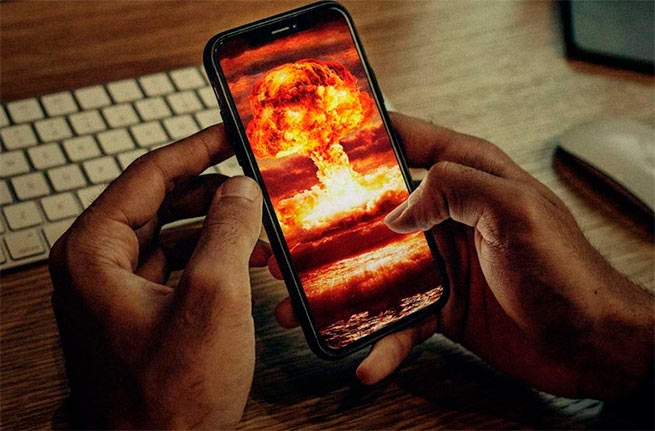One tragedy follows another, and as a result we find ourselves glued to the screen in a constant scroll: opening one link after another, absorbing every piece of information, every terrible detail, becoming addicted to the pain.
You are in the office you take a break from work and turn on your phone to take your mind off things. Meanwhile, the search algorithm first pulls up news about beheaded babies.
You’re at home, it’s already late at night, everyone is asleep. Your face is illuminated by a small screen. You are reading about a girl from Thessaloniki who disappeared in Israel. You are on the playground. With one hand you push the swing, with the other you watch a video of a family begging for mercy. You leave school, take the bus home. You turn on TikTok, the screams of children from a music festival in Israel pouring from your headphones into your ears.

A pandemic, the invasion of Ukraine, Tempi, disasters, fires, floods, murders, femicide, the war between Hamas and Israel… One tragedy after another, and they all keep us glued to the screen in incessant doom scrolling social networks, especially anxious, depressing or generally negative news), open one link after another, absorb every piece of information, every terrible detail, addicted to agony.
“Did you hear that?” – asks one. “Yes. Have you read about it?” Another exaggerates in cruelty. But how much cruelty can we endure?
Diffidence
“With every accident, war, bloodshed or crime, public opinion is stunned, watches, collects published detailed information, tries to understand, interpret the incomprehensible, explain the tragedy, drive out the evil, – explains Adonios C. Dakanalis, professor and principal researcher of psychiatry and psychotherapy at the Bicoca University in Milan. – It is in our nature, because of the empathy that characterizes the human species, to sympathize with those who face tragedy, whatever it may be, for example, the war between Hamas and Israel, the unfortunate 36-year-old guy who died so inhumanely and martyrically in the port Piraeus, tragedy in Tempe and Thessaly”. There were also personal costs. “If we take into account the burdened daily life of each of us with all the economic and social difficulties, the personal traumas that each of us carries within us in one way or another, plus the constant exposure to negative news and scenes of violence, then perhaps we can understand why mental problems character, such as anxiety, depression, panic attacks, feelings of fear and uncertainty appear more and more often.”

Indeed, research has shown that the war in Ukraine, the threat of nuclear war and the current crisis in the Middle East have significantly increased citizens’ self-doubt and have had a noticeable impact on our mental health. “Every day we see people who experience fear, somatize their anxiety, and have disrupted sleep and daily functioning. People with already compromised mental health see their condition worsen. In an attempt to protect themselves psychologically, some deny, minimize or ignore reality, others express anger and rage, substance abuse, violence outside and within the family, which is the most important center of human personality formation and the last port of call in any crisis. At the same time, says Mr. Dakanalis, creates a feeling of lack of trust. Young people are afraid to face or invest in a future that is increasingly unpredictable.”
It’s not just about exposure to violence. As Ioana Vovou, Associate Professor at the Department of Communication, Media and Culture at Panteo University, says, what makes the current situation unprecedented is not only the constant repetition of images through different platforms, but also their alternation. “Images of violence alternate with images of lifestyle, news about war with news about show business or what is happening in Syriza with the new leader. It all seems to fall into the same funnel. And the question is: does “Is it all on us in the end, or have we become immune to tragic news? Accordingly, will our concern about what is happening be blown away after the re-release?”

Psychologist-family therapist Ioanna Georgopoulou talks about “compassion fatigue”: “Without enough space and time to process events and the emotions they evoke in people, incessant empathy often leads to emotional exhaustion. Society does not know where to pick up the thread of fatigue, and so decides to cut the thread. Desensitize its response to the pain experienced by others to cope. Desensitization is an emotional defense mechanism when the stress of violent events is so acute that it becomes unbearable. It is not that we stop feeling, but that we become so resonant that we cannot cope with the stress we experience and need protection. Prolonged empathic preoccupation with what is happening, without the opportunity to gain relief through action, contributing to the solution of the problem or participating in collective mourning, creates a society of fatigue that desensitizes itself in order to survive.” “Normalization of terror,” according to experts, can also affect children’s relationships with violence, leading them to cruel, delinquent behavior, and bullying.”
Using social networks
Evidence shows that we are increasingly using social media (according to research firm TechJury, the average time spent on social media has increased from 2 hours in 2019 to 2.5 hours in 2022) and perhaps for the wrong reasons. Almost 65% of Greek Generation Z (those born between the late 90s and 2010), one of the highest percentages in the world, spend time on social media platforms in an attempt to calm your anxiety or depression. However, an equally large percentage of Gen Z (44%) say spending time on their smartphones makes their symptoms worse (only 17% of Boomers say the same).
“I recommend setting aside a certain amount of time to follow news from trusted sources first, because during a crisis, misinformation spreads like lightning, only contributing to panic and anxiety. If they find themselves frantically reaching for their cell phone at night, When they can’t sleep, I encourage them to switch their attention to calmer news on the Internet instead of tripping over the headlines.” – he concludes.

Children need to be helped to “consume” information
“The other day my daughter and I were watching a movie on Netflix, and at some point she got up and went to her room. “I don’t want to watch a movie when things like this happen.”– she said, referring to Israel, – says A., mother of 14-year-old M. – I came in and we talked. “All the kids are anxious,” she said. This was superimposed on the constant shock that we receive from the events in Ukraine”. Like everyone else, children and teenagers have recently been exposed to a barrage of negative news to a greater or lesser extent. “Many children become upset about tragedies they see on the news, even if they do not express their feelings openly.” – says the author of the article, a graduate student in the Department of Journalism and Media at the Aristotle University of Thessaloniki, Katerina Chrysanthopoulou, administrator of the website MediaLiteracyMatters.org, which promotes digital media literacy issues.
“Especially young children who see repeated images may believe that this is happening repeatedly, and if we as their parents feel anxious, their anxiety may increase.”. Also at risk are teenagers who mainly receive information from social networks such as TikTok and viral posts on them, which, of course, do not always reflect real facts and truth. “Many teenagers may also doomscroll, meaning they tend to see unpleasant scenes over and over again. This, in addition to leading them to develop a negative view of reality, can also manifest itself as stress.”

Teenage psyche being tested
But what can we do to support them? “Just as on an airplane, we first put an oxygen mask on, and then on our children, so in the case of unpleasant news, we first calm down, and then we can help our children “absorb” the information. “It is important that we ourselves know how how we feel about an unfortunate event and what message we want to convey to our children,” says Ms. Chrysanthopoulou.
“We acknowledge their thoughts, feelings and reactions so they understand that their issues are important.”
In particular for younger children she suggests limiting your time watching news programs and watching them together. We ask open questions: “What did you hear?”, “Where did you hear this?”, “What do you think about it?”. We acknowledge their thoughts, feelings and reactions so they understand that their questions are important. We reassure them of safety in simple terms, emphasizing that we are with them. We encourage them to process history through play and art. We look for signs of severe anxiety such as constant fears, crying, separation anxiety, refusal to go to school, etc. We maintain a daily routine at home and spend more time together. We make sure that the conversation always ends positively and the child is reassured.

For teenagers: We talk to them. We are prepared for awkward or difficult questions – if we don’t know something, we say we need time to study so we can catch up. We listen carefully to what they convey to us so that we are aware of any misinformation, misunderstandings or hidden fears. We use neutral language. We explain the social, technical and political context in which an event occurs, avoiding labels. We help distinguish the reliability of information sources. We teach them to ask themselves about every piece of information: “who wrote this?”, “why did they write this?”, “what is their opinion?”, “what information is highlighted and what element is not included in this information?”. If the issue is divisive, avoid strong characterizations and accusations (we don’t want division and hatred to take root as an emotion in our child, nor do we want it to infiltrate the school). It is important to explain that many people are now working to improve the situation. We ask them not to take their mobile phone to bed at night. We share our own feelings. We remain calm and collected because we lead by example, reassure them at the end of every conversation, and don’t make unrealistic promises. Sometimes we don’t have all the answers “Why” and it is important to dare to say: “I don’t know why this happened”. We are always ready to hug and give hope.







More Stories
"Chic, shine, beauty!": what kind of men do women find attractive?
Atmosphere of horror and panic with bed bugs
How to understand that you are being deceived – the method of three points